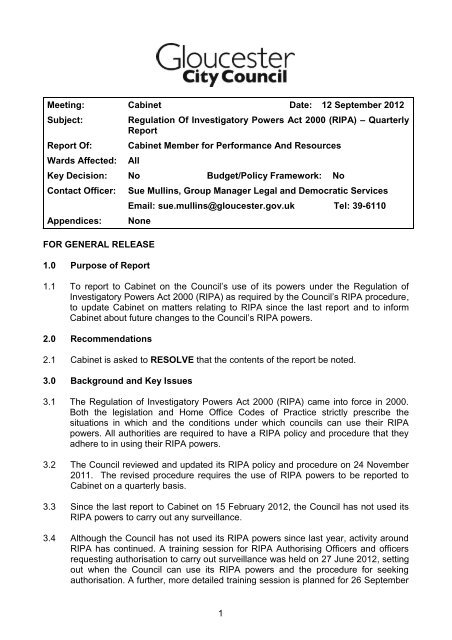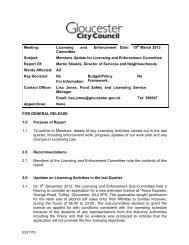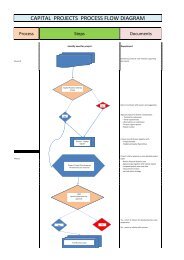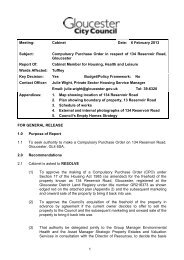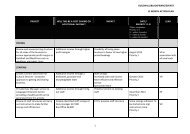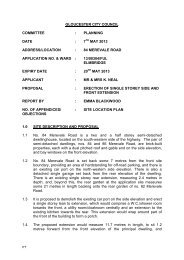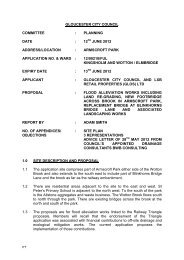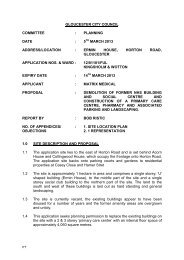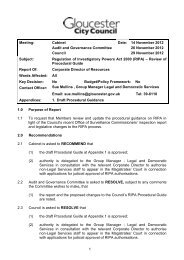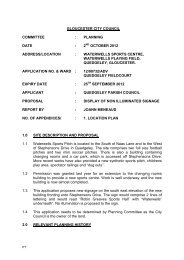Regulation Of Investigatory Powers Act 2000 (RIPA) - Democracy ...
Regulation Of Investigatory Powers Act 2000 (RIPA) - Democracy ...
Regulation Of Investigatory Powers Act 2000 (RIPA) - Democracy ...
You also want an ePaper? Increase the reach of your titles
YUMPU automatically turns print PDFs into web optimized ePapers that Google loves.
Meeting: Cabinet Date: 12 September 2012Subject:Report <strong>Of</strong>:Wards Affected:<strong>Regulation</strong> <strong>Of</strong> <strong>Investigatory</strong> <strong>Powers</strong> <strong>Act</strong> <strong>2000</strong> (<strong>RIPA</strong>) – QuarterlyReportCabinet Member for Performance And ResourcesAllKey Decision: No Budget/Policy Framework: NoContact <strong>Of</strong>ficer:Appendices:Sue Mullins, Group Manager Legal and Democratic ServicesEmail: sue.mullins@gloucester.gov.uk Tel: 39-6110NoneFOR GENERAL RELEASE1.0 Purpose of Report1.1 To report to Cabinet on the Council’s use of its powers under the <strong>Regulation</strong> of<strong>Investigatory</strong> <strong>Powers</strong> <strong>Act</strong> <strong>2000</strong> (<strong>RIPA</strong>) as required by the Council’s <strong>RIPA</strong> procedure,to update Cabinet on matters relating to <strong>RIPA</strong> since the last report and to informCabinet about future changes to the Council’s <strong>RIPA</strong> powers.2.0 Recommendations2.1 Cabinet is asked to RESOLVE that the contents of the report be noted.3.0 Background and Key Issues3.1 The <strong>Regulation</strong> of <strong>Investigatory</strong> <strong>Powers</strong> <strong>Act</strong> <strong>2000</strong> (<strong>RIPA</strong>) came into force in <strong>2000</strong>.Both the legislation and Home <strong>Of</strong>fice Codes of Practice strictly prescribe thesituations in which and the conditions under which councils can use their <strong>RIPA</strong>powers. All authorities are required to have a <strong>RIPA</strong> policy and procedure that theyadhere to in using their <strong>RIPA</strong> powers.3.2 The Council reviewed and updated its <strong>RIPA</strong> policy and procedure on 24 November2011. The revised procedure requires the use of <strong>RIPA</strong> powers to be reported toCabinet on a quarterly basis.3.3 Since the last report to Cabinet on 15 February 2012, the Council has not used its<strong>RIPA</strong> powers to carry out any surveillance.3.4 Although the Council has not used its <strong>RIPA</strong> powers since last year, activity around<strong>RIPA</strong> has continued. A training session for <strong>RIPA</strong> Authorising <strong>Of</strong>ficers and officersrequesting authorisation to carry out surveillance was held on 27 June 2012, settingout when the Council can use its <strong>RIPA</strong> powers and the procedure for seekingauthorisation. A further, more detailed training session is planned for 26 September1
2012, which will cover changes in the <strong>RIPA</strong> process due to come into force later thisyear as well as the procedure to be followed.3.5 The Council has also had its triennial visit by the <strong>Of</strong>fice of SurveillanceCommissioners (OSC) to look at the Council’s use of its <strong>RIPA</strong> powers. The visit wascarried out by HH Dr Colin Kolbert on 27 June 2012. Dr Kolbert looked at theCouncil’s policy and procedure, the <strong>RIPA</strong> forms completed since the last inspectionin 2009 and the <strong>RIPA</strong> training records. Overall, he indicated that he was satisfiedwith the Council’s <strong>RIPA</strong> arrangements and made several suggestions as to how theCouncil’s policy and procedures could be improved. The letter formally confirmingthe OSC’s recommendations is awaited and will be reported to Cabinet in duecourse. It is anticipated that recommendations will be made regarding minorchanges to the Council’s policy and procedure and it is therefore suggested that thereview of the Council’s <strong>RIPA</strong> policy and procedure due to be reported to Cabinet inSeptember 2012 is carried out after receipt of the OSC’s formal response.3.6 There is also a need to take account of changes to the Council’s <strong>RIPA</strong> surveillancepowers due to come into force on 1 November 2012. The <strong>Regulation</strong> of<strong>Investigatory</strong> <strong>Powers</strong> (Directed Surveillance and Covert Human IntelligenceSources (Amendment) Order 2012 amends the current position where localauthorities demonstrate the necessity of using surveillance for reasons relating tothe prevention and detection of crime or disorder. From 1 November 2012, theCouncil will only be able to meet the necessity test for use of its <strong>RIPA</strong> powers wherethe offence under investigation carries a maximum term of imprisonment of at least6 months, whether at Magistrates or Crown Court, or would constitute one of theoffences below:(i) section 146 of the Licensing <strong>Act</strong> 2003(2) (sale of alcohol to children);(ii) section 147 of the Licensing <strong>Act</strong> 2003 (allowing the sale of alcohol to children);(iii) section 147A of the Licensing <strong>Act</strong> 2003(3) (persistently selling alcohol tochildren);(iv) section 7 of the Children and Young Persons <strong>Act</strong> 1933(4) (sale of tobacco, etc.to persons under eighteen)”.3.7 This will reduce the scope for the Council to make use of its <strong>RIPA</strong> powers as manyof the types of offences that can be investigated and prosecuted by the Council donot carry the necessary maximum term of imprisonment. The training session dueto take place in September will explore the types of offences for which <strong>RIPA</strong> powerswill be available to the Council to ensure that <strong>Of</strong>ficers are aware of when <strong>RIPA</strong>surveillance can be used during investigation of a potential offence.3.8 The Home <strong>Of</strong>fice review of Counter-Terrorism and Security <strong>Powers</strong> in 2010 resultedin the Protection of Freedoms <strong>Act</strong> which received Royal Assent on 1 May 2012.Section 32 of the <strong>Act</strong> amends the <strong>RIPA</strong> legislation to require Magistrates’ approvalfor Directed surveillance and Covert Human Intelligence Source (CHIS) surveillancebefore an authorisation made by a local authority can come into effect. Themagistrate will be required to consider whether it was, and continues to be,reasonable for the local authority to believe that the use of the covert technique inquestion is necessary and proportionate. A magistrate is able to exercise his or herown discretion and judgement when deciding whether to approve the authorisation.This provision has not yet been brought into force and changes to the Council’s2
policy and procedure will be required as and when this particular provision takeseffect.4.0 Alternative Options Considered4.1 There are no alternative options relevant to this matter.5.0 Reasons for Recommendations5.1 At this stage, however, no action is required and the recommendation is thereforefor Cabinet to note work to date and future action required.6.0 Future Work and Conclusions6.1 Changes to the Council’s <strong>RIPA</strong> policy and procedure will be required later this year,following the outcome of the OSC inspection and the forthcoming changes to theCouncil’s <strong>RIPA</strong> powers. Training of officers is planned for September to ensure thatenforcing and authorising <strong>Of</strong>ficers are aware of the changes to the Council’s <strong>RIPA</strong>powers and procedures.7.0 Financial Implications7.1 There are no financial implications arising out of this report.8.0 Legal Implications8.1 The legal implications are set out in the main body of the report.9.0 Risk & Opportunity Management Implications9.1 Updating the Council’s policy and procedure and ensuring that officers are trained inuse of <strong>RIPA</strong> powers will ensure that the risk of the Council acting ultra vires isminimised.10.0 People Impact Assessment (PIA):10.1 The impact of the changes to the <strong>RIPA</strong> legislation will have been considered by theGovernment during the drafting of the legislation. The <strong>RIPA</strong> legislation requires theCouncil to give substantial consideration to the people impact of using its <strong>RIPA</strong>powers each and every time a <strong>RIPA</strong> application is authorised.10.2 The PIA Screening Stage was completed and did not identify any potential or actualnegative impact, therefore a full PIA was not required.11.0 Other Corporate ImplicationsCommunity Safety11.1 The use of <strong>RIPA</strong> powers by the Council can contribute to ensuring communitysafety.3
Sustainability11.2 There are no sustainability implications arising out of this report.Staffing & Trade Union11.3 There are no staffing implications arising out of this report.Background Documents:NoneCabinet report – 15 February 2012<strong>Regulation</strong> of <strong>Investigatory</strong> <strong>Powers</strong> <strong>Act</strong> <strong>2000</strong>Protection of Freedoms <strong>Act</strong> 2012Gloucester City Council <strong>Regulation</strong> of <strong>Investigatory</strong> <strong>Powers</strong> <strong>Act</strong> <strong>2000</strong> Procedural Guide4


